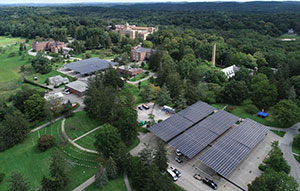Maryknoll Installs Westchester’s Largest Solar Canopy

By Michael Gold
Maryknoll Fathers and Brothers has just installed the largest solar canopy in Westchester, but the missionaries are asking for competition.
“I’m hoping to be an example,” said Fr. Raymond Finch, Maryknoll’s Superior General.
“This is a first step. It will take hundreds of thousands of steps to make a difference,” he said.
Designed by Ecogy Energy and installed by GreenSpark Solar, Maryknoll built more than 2,100 solar panels on 12 canopies over two parking lots covering about 500 parking spots. The system, the first solar canopy and community solar project in the Town of Ossining, was formally introduced on Sept. 14 in a ribbon-cutting ceremony at the site.
The panels will generate about 1.2 million kilowatt-hours per year, which can power anywhere from 100 to 225 households over that period, depending on the size of the home, explained Brock Gibian, director of development for Ecogy Energy. This is equivalent to planting more than 1,100 trees or saving 1.7 million miles driving a gas-powered vehicle.
The community solar project will reduce electric bills by about 10 percent for households that sign up for the energy derived from the project n Ossining. More than 75 households have enrolled so far. Maryknoll will also enjoy the same cost reduction and receive lease payments from Ecogy, which will manage the installation.
Over the 25-year life of the project, the solar canopy will generate roughly the clean energy equivalent of using 4,400 gas-powered vehicles for a year, saving more than two million gallons of gasoline, or 3,700 homes burning fossil fuels to generate electricity in one year, using the U.S. Environmental Protection Agency calculator.
The solar panels are double-sided, which means they produce more electricity. They are designed to withstand all types of precipitation, from rain to hail to ice.
Brooklyn-based Ecogy has designed rooftop solar installations for Croton-on-Hudson’s Department of Public Works garage and Arcadia Farm’s horse-riding arena in Yorktown.
GreenSpark Solar, based near Rochester, has installed solar panels for businesses, universities, homes, farms and wineries.
Additionally, Ecogy is designing a rooftop solar project at the closed St. Theresa K-8 school, for the Archdiocese of New York, in Briarcliff Manor.
“Our attitude is the project could never have been realized without Maryknoll, the New York State Energy Research and Development Authority (NYSERDA) and the Town of Ossining Supervisor Dana Levenberg,” Gibian said.
“Maryknoll has always been an incredible steward of the environment,” Gibian stated. “They always want to help the community and the most vulnerable.”
Finch explained why Maryknoll Fathers and Brothers, which conducts missionary work in 20 countries in South America, Africa and Asia, including helping farmers develop climate-smart strategies, providing food and medical aid to the poor and helping migrants and refugees, initiated the project.
“The climate crisis is becoming more urgent. To hear the cry of the Earth, and the poor, and to respond to it – that’s the core of what we want to be about,” he said. “The people who suffer the most are on the periphery.”
Finch, who has been an ordained priest for 43 years, said his experience in countries like Peru and Bolivia helped influence his thinking about climate change.
“The indigenous Campesinos (peasant farmers) in Peru experience flood and drought because of climate change,” Finch said. “These people are struggling to survive.”
“Here at home, we’ve seen a lot of storms because of climate change,” he added. “But to the poorest of the poor, a drought is disastrous. A drought can mean illness and death. And flooding means they have no home.”
Finch said he is optimistic that other organizations will start thinking about installing solar power as well.
“Hopefully, we can point the way.”

Examiner Media – Keeping you informed with professionally-reported local news, features, and sports coverage.
